Why are Democrats against tax cuts and strong borders?
Well, the answer is easy, if you have an open mind.
Democrats are trying their best to create poverty. According to their own statistics....Democrats do better at the polls with the poor than Republicans. Also, Democrats do better with the extremely wealthy. Why is that? Because Democrat policies don't just make the poor poorer. They make the rich richer.
This why it's so ironic that they bellyache about tax cuts for the rich.....many of their spokespeople are willing to go public because Democrats cut them a deal to forgive their huge tax bills. So they help their rich friends while making themselves rich....while screwing the poor and creating a ever widening income gap.
A journey through a land of extreme poverty: welcome to America
Los Angeles, California, 5 December
“You got a choice to make, man. You could go straight on to heaven. Or you could turn right, into that.”
We are in Los Angeles, in the heart of one of America’s wealthiest cities, and General Dogon, dressed in black, is our tour guide. Alongside him strolls another tall man, grey-haired and sprucely decked out in jeans and suit jacket. Professor Philip Alston is an Australian academic with a formal title: UN special rapporteur on extreme poverty and human rights.
General Dogon, himself a veteran of these Skid Row streets, strides along, stepping over a dead rat without comment and skirting round a body wrapped in a worn orange blanket lying on the sidewalk.
The two men carry on for block after block after block of tatty tents and improvised tarpaulin shelters. Men and women are gathered outside the structures, squatting or sleeping, some in groups, most alone like extras in a low-budget dystopian movie.
We come to an intersection, which is when General Dogon stops and presents his guest with the choice. He points straight ahead to the end of the street, where the glistening skyscrapers of downtown LA rise up in a promise of divine riches.
Heaven.
Then he turns to the right, revealing the “black power” tattoo on his neck, and leads our gaze back into Skid Row bang in the center of LA’s downtown. That way lies 50 blocks of concentrated human humiliation. A nightmare in plain view, in the city of dreams.
Alston turns right.
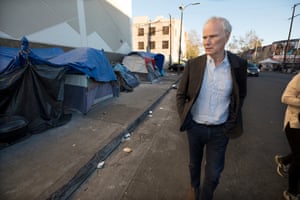
Philip Alston in downtown LA. Photograph: Dan Tuffs for the Guardian
So begins a two-week journey into the dark side of the American Dream. The spotlight of the UN monitor, an independent arbiter of human rights standards across the globe, has fallen on this occasion on the US, culminating on Friday with the release of his initial report in Washington.
His fact-finding mission into the richest nation the world has ever known has led him to investigate the tragedy at its core: the 41 million people who officially live in poverty.
Of those, nine million have zero cash income – they do not receive a cent in sustenance.
Alston’s epic journey has taken him from coast to coast, deprivation to deprivation. Starting in LA and San Francisco, sweeping through the Deep South, traveling on to the colonial stain of Puerto Rico then back to the stricken coal country of West Virginia, he has explored the collateral damage of America’s reliance on private enterprise to the exclusion of public help.
The Guardian had unprecedented access to the UN envoy, following him as he crossed the country, attending all his main stops and witnessing the extreme poverty he is investigating firsthand.
Think of it as payback time. As the UN special rapporteur himself put it: “Washington is very keen for me to point out the poverty and human rights failings in other countries. This time I’m in the US.”
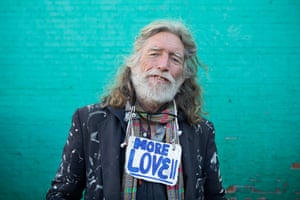
David Busch, who is currently homeless on Venice beach, in Los Angeles. Photograph: Dan Tuffs for the Guardian
The tour comes at a critical moment for America and the world. It began on the day that Republicans in the US Senate voted for sweeping tax cuts that will deliver a bonanza for the super wealthy while in time raising taxes on many lower-income families. The changes will exacerbate wealth inequality that is already the most extreme in any industrialized nation, with three men – Bill Gates, Jeff Bezos and Warren Buffet – owning as much as half of the entire American people.
A few days into the UN visit, Republican leaders took a giant leap further. They announced plans to slash key social programs in what amounts to an assault on the already threadbare welfare state.
“Look up! Look at those banks, the cranes, the luxury condos going up,” exclaimed General Dogon, who used to be homeless on Skid Row and now works as a local activist with Lacan. “Down here, there’s nothing. You see the tents back to back, there’s no place for folks to go.”
California made a suitable starting point for the UN visit. It epitomizes both the vast wealth generated in the tech boom for the 0.001%, and the resulting surge in housing costs that has sent homelessness soaring. Los Angeles, the city with by far the largest population of street dwellers in the country, is grappling with crisis numbers that increased 25% this past year to 55,000.
The safety net? It has too many holes in it for me
Robert Chambers, Los Angeles
Ressy Finley, 41, was busy sterilizing the white bucket she uses to slop out in her tent in which she has lived on and off for more than a decade. She keeps her living area, a mass of worn mattresses and blankets and a few motley possessions, as clean as she can in a losing battle against rats and cockroaches. She also endures waves of bed bugs, and has large welts on her shoulder to prove it.
She receives no formal income, and what she makes on recycling bottles and cans is no way enough to afford the average rents of $1,400 a month for a tiny one-bedroom. A friend brings her food every couple of days, the rest of the time she relies on nearby missions.
She cried twice in the course of our short conversation, once when she recalled how her infant son was taken from her arms by social workers because of her drug habit (he is now 14; she has never seen him again). The second time was when she alluded to the sexual abuse that set her as a child on the path towards drugs and homelessness.
Given all that, it’s remarkable how positive Finley remains. What does she think of the American Dream, the idea that everyone can make it if they try hard enough? She replies instantly: “I know I’m going to make it.”
A 41-year-old woman living on the sidewalk in Skid Row going to make it?
“Sure I will, so long as I keep the faith.”
What does “making it” mean to her?
“I want to be a writer, a poet, an entrepreneur, a therapist.”
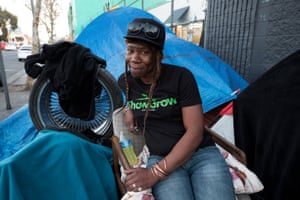
Ressy Finley, who lives in a tent on 6th Street in Downtown LA. Photograph: Dan Tuffs for the Guardian
Robert Chambers occupies the next patch of sidewalk along from Finley’s. He’s created an area around his tent out of wooden pallets, what passes in Skid Row for a cottage garden.
He has a sign up saying “Homeless Writers Coalition”, the name of a group he runs to give homeless people dignity against what he calls the “animalistic” aspects of their lives. He’s referring not least to the lack of public bathrooms that forces people to relieve themselves on the streets.
LA authorities have promised to provide more access to toilets, a critical issue given the deadly outbreak of Hepatitis A that began in San Diego and is spreading on the west coast claiming 21 lives mainly through lack of sanitation in homeless encampments. At night local parks and amenities are closed specifically to keep homeless people out.
Skid Row has had the use of nine toilets at night for 1,800 street-faring people. That’s a ratio well below that mandated by the UN in its camps for Syrian refugees.
“It’s inhuman actually, and eventually in the end you will acquire animalistic psychology,” Chambers said.
He has been living on the streets for almost a year, having violated his parole terms for drug possession and in turn being turfed out of his low-cost apartment. There’s no help for him now, he said, no question of “making it”.
“The safety net? It has too many holes in it for me.”
Of all the people who crossed paths with the UN monitor, Chambers was the most dismissive of the American Dream. “People don’t realize – it’s never getting better, there’s no recovery for people like us. I’m 67, I have a heart condition, I shouldn’t be out here. I might not be too much longer.”
That was a lot of bad karma to absorb on day one, and it rattled even as seasoned a student of hardship as Alston. As UN special rapporteur, he’s reported on dire poverty and its impact on human rights in Saudi Arabia and China among other places. But Skid Row?
“I was feeling pretty depressed,” he told the Guardian later. “The endless drumbeat of horror stories. At a certain point you do wonder what can anyone do about this, let alone me.”
And then he took a flight up to San Francisco, to the Tenderloin district where homeless people congregate, and walked into St Boniface church.
What he saw there was an analgesic for his soul.
San Francisco, California, 6 December
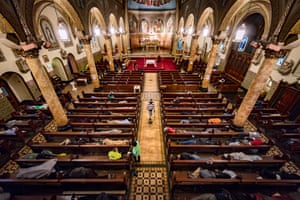
The Gubbio project at St Boniface in San Francisco. The church opens its doors every weekday at 6am to allow homeless people to rest until 3pm. Photograph: David Levene for the Guardian
About 70 homeless people were quietly sleeping in pews at the back of the church, as they are allowed to do every weekday morning, with worshippers praying harmoniously in front of them. The church welcomes them in as part of the Catholic concept of extending the helping hand.
“I found the church surprisingly uplifting,” Alston said. “It was such a simple scene and such an obvious idea. It struck me – Christianity, what the hell is it about if it’s not this?”
It was a rare drop of altruism on the west coast, competing against a sea of hostility. More than 500 anti-homeless laws have been passed in Californian cities in recent years. At a federal level, Ben Carson, the neurosurgeon who Donald Trump appointed US housing secretary, is decimating government spending on affordable housing.
Perhaps the most telling detail: apart from St Boniface and its sister church, no other place of worship in San Francisco welcomes homeless people. In fact, many have begun, even at this season of goodwill, to lock their doors to all comers simply so as to exclude homeless people.
As Tiny Gray-Garcia, herself on the streets, described it to Alston, there is a prevailing attitude that she and her peers have to contend with every day. She called it the “violence of looking away”.
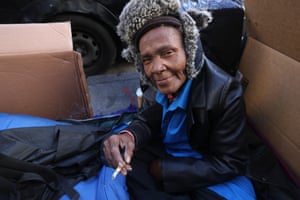
Coy Catley, 63, in her homeless box made of cardboard sheets on a sidewalk of Tenderloin, San Francisco. Photograph: Ed Pilkington for the Guardian
That cruel streak – the violence of looking away – has been a feature of American life since the nation’s founding. The casting off the yoke of overweening government (the British monarchy) came to be equated in the minds of many Americans with states’ rights and the individualistic idea of making it on your own – a view that is fine for those fortunate enough to do so, less happy if you’re born on the wrong side of the tracks.
Countering that has been the conviction that society must protect its own against the vagaries of hunger or unemployment that informed Franklin Roosevelt’s New Deal and the Great Society of Lyndon Johnson. But in recent times the prevailing winds have blown strongly in the “you’re on your own, buddy” direction. Ronald Reagan set the trend with his 1980s tax cuts, followed by Bill Clinton, whose 1996 decision to scrap welfare payments for low-income families is still punishing millions of Americans.
The cumulative attack has left struggling families, including the 15 million children who are officially in poverty, with dramatically less support than in any other industrialized economy. Now they face perhaps the greatest threat of all.
As Alston himself has written in an essay on Trump’s populism and the aggressive challenge it poses to human rights: “These are extraordinarily dangerous times. Almost anything seems possible.”
Lowndes County, Alabama, 9 December
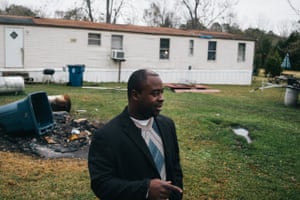
Aaron Thigpen discusses the poor sewage conditions in Butler County. Improper treatment has put the population at risk of diseases long believed to be extinct in the US. Photograph: Bob Miller for the Guardian
This week, the Black Belt bit back. On Tuesday a new line was added to that simple graphic, showing exactly the same half-moon across Alabama except this time it was not black but blue.
It depicted the army of African American voters who turned out against the odds to send Doug Jones to the US Senate, the first Democrat from Alabama to do so in a generation. It delivered a bloody nose to his opponent, the alleged child molester Roy Moore, and his puppetmasters Steve Bannon and Donald Trump.
It was arguably the most important expression of black political muscle in the region since King’s 1965 march. If the previous entries in the graphic could be labeled “soil”, “slavery” and “poverty”, this one should be captioned “empowerment”.
Well, the answer is easy, if you have an open mind.
Democrats are trying their best to create poverty. According to their own statistics....Democrats do better at the polls with the poor than Republicans. Also, Democrats do better with the extremely wealthy. Why is that? Because Democrat policies don't just make the poor poorer. They make the rich richer.
This why it's so ironic that they bellyache about tax cuts for the rich.....many of their spokespeople are willing to go public because Democrats cut them a deal to forgive their huge tax bills. So they help their rich friends while making themselves rich....while screwing the poor and creating a ever widening income gap.
A journey through a land of extreme poverty: welcome to America
Los Angeles, California, 5 December
“You got a choice to make, man. You could go straight on to heaven. Or you could turn right, into that.”
We are in Los Angeles, in the heart of one of America’s wealthiest cities, and General Dogon, dressed in black, is our tour guide. Alongside him strolls another tall man, grey-haired and sprucely decked out in jeans and suit jacket. Professor Philip Alston is an Australian academic with a formal title: UN special rapporteur on extreme poverty and human rights.
General Dogon, himself a veteran of these Skid Row streets, strides along, stepping over a dead rat without comment and skirting round a body wrapped in a worn orange blanket lying on the sidewalk.
The two men carry on for block after block after block of tatty tents and improvised tarpaulin shelters. Men and women are gathered outside the structures, squatting or sleeping, some in groups, most alone like extras in a low-budget dystopian movie.
We come to an intersection, which is when General Dogon stops and presents his guest with the choice. He points straight ahead to the end of the street, where the glistening skyscrapers of downtown LA rise up in a promise of divine riches.
Heaven.
Then he turns to the right, revealing the “black power” tattoo on his neck, and leads our gaze back into Skid Row bang in the center of LA’s downtown. That way lies 50 blocks of concentrated human humiliation. A nightmare in plain view, in the city of dreams.
Alston turns right.

Philip Alston in downtown LA. Photograph: Dan Tuffs for the Guardian
So begins a two-week journey into the dark side of the American Dream. The spotlight of the UN monitor, an independent arbiter of human rights standards across the globe, has fallen on this occasion on the US, culminating on Friday with the release of his initial report in Washington.
His fact-finding mission into the richest nation the world has ever known has led him to investigate the tragedy at its core: the 41 million people who officially live in poverty.
Of those, nine million have zero cash income – they do not receive a cent in sustenance.
Alston’s epic journey has taken him from coast to coast, deprivation to deprivation. Starting in LA and San Francisco, sweeping through the Deep South, traveling on to the colonial stain of Puerto Rico then back to the stricken coal country of West Virginia, he has explored the collateral damage of America’s reliance on private enterprise to the exclusion of public help.
The Guardian had unprecedented access to the UN envoy, following him as he crossed the country, attending all his main stops and witnessing the extreme poverty he is investigating firsthand.
Think of it as payback time. As the UN special rapporteur himself put it: “Washington is very keen for me to point out the poverty and human rights failings in other countries. This time I’m in the US.”

David Busch, who is currently homeless on Venice beach, in Los Angeles. Photograph: Dan Tuffs for the Guardian
The tour comes at a critical moment for America and the world. It began on the day that Republicans in the US Senate voted for sweeping tax cuts that will deliver a bonanza for the super wealthy while in time raising taxes on many lower-income families. The changes will exacerbate wealth inequality that is already the most extreme in any industrialized nation, with three men – Bill Gates, Jeff Bezos and Warren Buffet – owning as much as half of the entire American people.
A few days into the UN visit, Republican leaders took a giant leap further. They announced plans to slash key social programs in what amounts to an assault on the already threadbare welfare state.
“Look up! Look at those banks, the cranes, the luxury condos going up,” exclaimed General Dogon, who used to be homeless on Skid Row and now works as a local activist with Lacan. “Down here, there’s nothing. You see the tents back to back, there’s no place for folks to go.”
California made a suitable starting point for the UN visit. It epitomizes both the vast wealth generated in the tech boom for the 0.001%, and the resulting surge in housing costs that has sent homelessness soaring. Los Angeles, the city with by far the largest population of street dwellers in the country, is grappling with crisis numbers that increased 25% this past year to 55,000.
The safety net? It has too many holes in it for me
Robert Chambers, Los Angeles
Ressy Finley, 41, was busy sterilizing the white bucket she uses to slop out in her tent in which she has lived on and off for more than a decade. She keeps her living area, a mass of worn mattresses and blankets and a few motley possessions, as clean as she can in a losing battle against rats and cockroaches. She also endures waves of bed bugs, and has large welts on her shoulder to prove it.
She receives no formal income, and what she makes on recycling bottles and cans is no way enough to afford the average rents of $1,400 a month for a tiny one-bedroom. A friend brings her food every couple of days, the rest of the time she relies on nearby missions.
She cried twice in the course of our short conversation, once when she recalled how her infant son was taken from her arms by social workers because of her drug habit (he is now 14; she has never seen him again). The second time was when she alluded to the sexual abuse that set her as a child on the path towards drugs and homelessness.
Given all that, it’s remarkable how positive Finley remains. What does she think of the American Dream, the idea that everyone can make it if they try hard enough? She replies instantly: “I know I’m going to make it.”
A 41-year-old woman living on the sidewalk in Skid Row going to make it?
“Sure I will, so long as I keep the faith.”
What does “making it” mean to her?
“I want to be a writer, a poet, an entrepreneur, a therapist.”

Ressy Finley, who lives in a tent on 6th Street in Downtown LA. Photograph: Dan Tuffs for the Guardian
Robert Chambers occupies the next patch of sidewalk along from Finley’s. He’s created an area around his tent out of wooden pallets, what passes in Skid Row for a cottage garden.
He has a sign up saying “Homeless Writers Coalition”, the name of a group he runs to give homeless people dignity against what he calls the “animalistic” aspects of their lives. He’s referring not least to the lack of public bathrooms that forces people to relieve themselves on the streets.
LA authorities have promised to provide more access to toilets, a critical issue given the deadly outbreak of Hepatitis A that began in San Diego and is spreading on the west coast claiming 21 lives mainly through lack of sanitation in homeless encampments. At night local parks and amenities are closed specifically to keep homeless people out.
Skid Row has had the use of nine toilets at night for 1,800 street-faring people. That’s a ratio well below that mandated by the UN in its camps for Syrian refugees.
“It’s inhuman actually, and eventually in the end you will acquire animalistic psychology,” Chambers said.
He has been living on the streets for almost a year, having violated his parole terms for drug possession and in turn being turfed out of his low-cost apartment. There’s no help for him now, he said, no question of “making it”.
“The safety net? It has too many holes in it for me.”
Of all the people who crossed paths with the UN monitor, Chambers was the most dismissive of the American Dream. “People don’t realize – it’s never getting better, there’s no recovery for people like us. I’m 67, I have a heart condition, I shouldn’t be out here. I might not be too much longer.”
That was a lot of bad karma to absorb on day one, and it rattled even as seasoned a student of hardship as Alston. As UN special rapporteur, he’s reported on dire poverty and its impact on human rights in Saudi Arabia and China among other places. But Skid Row?
“I was feeling pretty depressed,” he told the Guardian later. “The endless drumbeat of horror stories. At a certain point you do wonder what can anyone do about this, let alone me.”
And then he took a flight up to San Francisco, to the Tenderloin district where homeless people congregate, and walked into St Boniface church.
What he saw there was an analgesic for his soul.
San Francisco, California, 6 December

The Gubbio project at St Boniface in San Francisco. The church opens its doors every weekday at 6am to allow homeless people to rest until 3pm. Photograph: David Levene for the Guardian
About 70 homeless people were quietly sleeping in pews at the back of the church, as they are allowed to do every weekday morning, with worshippers praying harmoniously in front of them. The church welcomes them in as part of the Catholic concept of extending the helping hand.
“I found the church surprisingly uplifting,” Alston said. “It was such a simple scene and such an obvious idea. It struck me – Christianity, what the hell is it about if it’s not this?”
It was a rare drop of altruism on the west coast, competing against a sea of hostility. More than 500 anti-homeless laws have been passed in Californian cities in recent years. At a federal level, Ben Carson, the neurosurgeon who Donald Trump appointed US housing secretary, is decimating government spending on affordable housing.
Perhaps the most telling detail: apart from St Boniface and its sister church, no other place of worship in San Francisco welcomes homeless people. In fact, many have begun, even at this season of goodwill, to lock their doors to all comers simply so as to exclude homeless people.
As Tiny Gray-Garcia, herself on the streets, described it to Alston, there is a prevailing attitude that she and her peers have to contend with every day. She called it the “violence of looking away”.

Coy Catley, 63, in her homeless box made of cardboard sheets on a sidewalk of Tenderloin, San Francisco. Photograph: Ed Pilkington for the Guardian
That cruel streak – the violence of looking away – has been a feature of American life since the nation’s founding. The casting off the yoke of overweening government (the British monarchy) came to be equated in the minds of many Americans with states’ rights and the individualistic idea of making it on your own – a view that is fine for those fortunate enough to do so, less happy if you’re born on the wrong side of the tracks.
Countering that has been the conviction that society must protect its own against the vagaries of hunger or unemployment that informed Franklin Roosevelt’s New Deal and the Great Society of Lyndon Johnson. But in recent times the prevailing winds have blown strongly in the “you’re on your own, buddy” direction. Ronald Reagan set the trend with his 1980s tax cuts, followed by Bill Clinton, whose 1996 decision to scrap welfare payments for low-income families is still punishing millions of Americans.
The cumulative attack has left struggling families, including the 15 million children who are officially in poverty, with dramatically less support than in any other industrialized economy. Now they face perhaps the greatest threat of all.
As Alston himself has written in an essay on Trump’s populism and the aggressive challenge it poses to human rights: “These are extraordinarily dangerous times. Almost anything seems possible.”
Lowndes County, Alabama, 9 December

Aaron Thigpen discusses the poor sewage conditions in Butler County. Improper treatment has put the population at risk of diseases long believed to be extinct in the US. Photograph: Bob Miller for the Guardian
This week, the Black Belt bit back. On Tuesday a new line was added to that simple graphic, showing exactly the same half-moon across Alabama except this time it was not black but blue.
It depicted the army of African American voters who turned out against the odds to send Doug Jones to the US Senate, the first Democrat from Alabama to do so in a generation. It delivered a bloody nose to his opponent, the alleged child molester Roy Moore, and his puppetmasters Steve Bannon and Donald Trump.
It was arguably the most important expression of black political muscle in the region since King’s 1965 march. If the previous entries in the graphic could be labeled “soil”, “slavery” and “poverty”, this one should be captioned “empowerment”.


